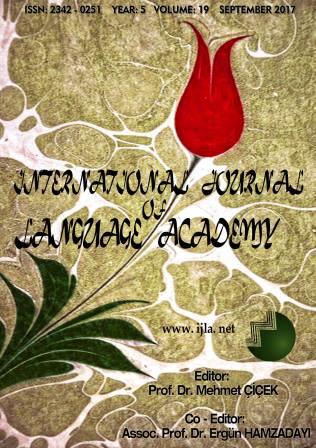Author :
Abstract
Metaphor analysis has been used in foreign language acquisition recently. In this way, students’ prior beliefs about learning a foreign language are possible to make explicit, identify, and analyze. So, this study attempted to make a metaphorical analysis to investigate how Turkish tertiary level EFL learners view their English as a Foreign Language (EFL) courses and if their perceptions are affected by gender, status at school, and self-reported academic success. Two hundred and fifty EFL learners were asked to generate metaphors of how they conceptualize learning English via prompts provided by the researcher. Data for the study were collected during the 2015-2016 academic year from the students of different faculties attending the School of Foreign Languages in a state university through a semi-structured questionnaire form. Firstly, a qualitative research method, which began classifying the data involving metaphorical images of the participants, was employed. Then, quantitative dimensions were analyzed. The results indicated that students used various positive and negative conceptualizations to reflect their beliefs about studying English as a foreign language. Their concept of English is essentially an instrument of a better career, a better life, and success in business. The desire to gain social recognition or economic advantages has been seen as the first motivation for learning English. In addition, gender and academic success were not significant factors on their perceptions but “status at school” was. EFL learners, especially the ones taking optional English courses, hold positive attitudes toward the process of learning English. Implications and applications for learning English as a foreign language and suggestions for future research were discussed.
Keywords
Abstract
Metaphor analysis has been used in foreign language acquisition recently. In this way, students’ prior beliefs about learning a foreign language are possible to make explicit, identify, and analyze. So, this study attempted to make a metaphorical analysis to investigate how Turkish tertiary level EFL learners view their English as a Foreign Language (EFL) courses and if their perceptions are affected by gender, status at school, and self-reported academic success. Two hundred and fifty EFL learners were asked to generate metaphors of how they conceptualize learning English via prompts provided by the researcher. Data for the study were collected during the 2015-2016 academic year from the students of different faculties attending the School of Foreign Languages in a state university through a semi-structured questionnaire form. Firstly, a qualitative research method, which began classifying the data involving metaphorical images of the participants, was employed. Then, quantitative dimensions were analyzed. The results indicated that students used various positive and negative conceptualizations to reflect their beliefs about studying English as a foreign language. Their concept of English is essentially an instrument of a better career, a better life, and success in business. The desire to gain social recognition or economic advantages has been seen as the first motivation for learning English. In addition, gender and academic success were not significant factors on their perceptions but “status at school” was. EFL learners, especially the ones taking optional English courses, hold positive attitudes toward the process of learning English. Implications and applications for learning English as a foreign language and suggestions for future research were discussed.





